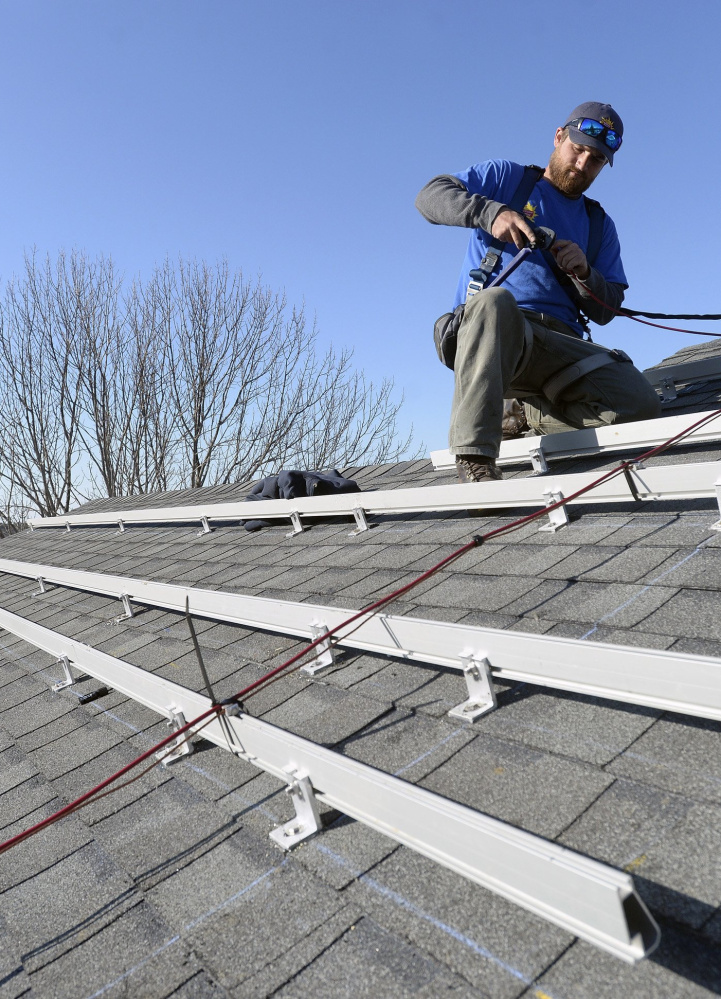Once again, the electric utility industry is spreading the same old tired falsehoods about solar net metering (“Maine Voices: Electric customers can’t subsidize solar,” Oct. 2). Don’t believe it.
Independent studies, in state after state including Maine, have repeatedly found that solar net metering saves money for all electric ratepayers. Plus, residential solar development is proven to help grow local economies, create new jobs, raise incomes and reduce pollution.
But the electric utilities want you to think otherwise, and appear to be willing to say anything to make their case.
The industry, working through trade groups, is in a panic about rooftop solar. A 2013 Edison Electric Institute report identified solar as a “disruptive technology,” capable of unraveling the utility industry’s monopoly franchise just as cell phones did to the landline telephone industry.
As part of that report, EEI laid out a playbook to undermine state policies that support consumer-owned rooftop solar. Their primary target – net metering, which is a key component of a modern energy grid that gives consumers the right to generate their own energy and get a fair credit for excess power sent to neighbors.
Net metering is the fundamental building block to any stable solar market, and currently exists in over 40 states across the country. Utilities have repeatedly tried (and failed) to label it a subsidy.
Maine got out ahead of this issue last year when the Public Utilities Commission, at the direction of the state Legislature, conducted a “Value of Solar” study. An independent consultant developed the initial PUC study. All stakeholders had the opportunity to submit evidence and comments. The final draft was then subject to open deliberations and received unanimous adoption by all three Maine PUC commissioners.
What was the PUC’s conclusion? Solar net metering benefits all ratepayers. In fact, the PUC found that the value of each kilowatt-hour of solar electricity a homeowner puts on the grid in Maine is worth more than the consumer gets back in net metering credits.
The study was updated this summer, showing that the benefits of solar to ratepayers are rising, even as the credits paid to solar generators are frozen.
The value of net metering is not a close question. Last month, the Massachusetts Department of Public Utilities found that no cost-shift from solar customers to non-solar customers exists, and struck down an electric utility proposal to raise rates on solar net metering. The state also decided to maintain uncapped net metering and extend key renewable energy programs.
Rhode Island recently expanded net metering and passed solar-specific incentives to encourage growth with the state’s new renewable portfolio standards. And New York is moving forward to open markets to a new, data-driven approach to bring more clean energy onto the electric grid.
In light of the clear and rising benefits, Maine should be encouraging homeowners to invest in solar. Adding more renewables to our energy mix will save money and lower the cost of electricity for all ratepayers – and that’s not even counting the other benefits of solar in Maine, like high-quality, much-needed jobs. Nor does it count for the social and environmental benefits, such as reduced pollution and less oil and gas drilling.
The fact is, the more energy we save – whether through efficiency, reduced use or by allowing homeowners to make their own clean, renewable electricity from the sun – the more everyone benefits.
Our electric utilities seem to feel entitled to unobstructed, ever-increasing profits, regardless of how good a job they actually do. That’s not the utility compact. Utilities should rightly be rewarded for investing in the public good. But they should not be allowed to block out new technologies that offer lower-cost, cleaner and better service.
In the case of solar, the data is clear: The public good is best served by a fair program to encourage homeowners to go solar.
Send questions/comments to the editors.



Success. Please wait for the page to reload. If the page does not reload within 5 seconds, please refresh the page.
Enter your email and password to access comments.
Hi, to comment on stories you must . This profile is in addition to your subscription and website login.
Already have a commenting profile? .
Invalid username/password.
Please check your email to confirm and complete your registration.
Only subscribers are eligible to post comments. Please subscribe or login first for digital access. Here’s why.
Use the form below to reset your password. When you've submitted your account email, we will send an email with a reset code.